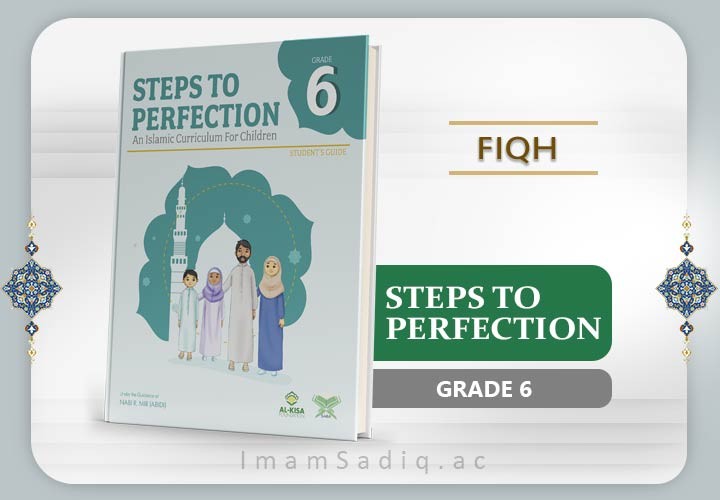Steps to Perfection Grade 6 Fiqh- Part 1
in Stufen zur Perfektion (Curriculum)Über diesen Kurs
In this course student will see leveled up Islamic Studies and will explore deeper FIQH concepts.
We attempted to include general information that we felt children need to know in order
to be educated and successful Muslims. Overall, the curriculum is divided into four core
areas: Aqāʾid, Fiqh, History, and Akhlāq. For grades 1-3, the Furūʿ ad-Dīn are included in
thE ʿAqāʾid section, but for grades 4-6, it has been moved to the Fiqh section. This is to help
students to first understand the basics of the Furūʿ ad-Dīn and then gradually increase their
understanding and practical application.
In these (Fiqh) sessions, we tried to incorporate those Fiqh topics that are relevant
and integrate more stories in order to make it more interactive for students.
Kommentare (0)
Many Muslims think that there must always be a scientific reason behind every law in Islam, or that the reason should be completely clear. While we may know some of the reasons, this is not always the case.
For example, we will never know why Fajr consists of two rakaʿāt while Ẓuhr has four rakaʿāt. Does this mean that we should pray how many rakʿāt we want? Of course not!
Another example we can think about is the scientific examples in the Qurʾān. While it’s good to reflect on the science in the Qurʾān, the scientific miracles in the Qurʾān shouldn’t be the reason we believe in it.
Video- Najis Things - Islamic Law (6)
One day, a group of women came complaining to Prophet Muḥammad (ṣ) that whenever they walked to the masjid, they had to walk by a sewer, which made their shoes najis. The Prophet (ṣ) replied that this was no problem, since the earth was a purifier. Once they stepped out of the sewer and walked on the earth (with certain conditions), the earth and its dust would make their shoes ṭāhir again.
Video- How to Purify with Water - Islamic Law (9)
In Islam, we have two forms of ablution: minor and major. The minor ablution is called wuḍūʾ, which we covered previously. The major ablution is called ghusl. The word ghusl in Arabic comes from the word gha-sala (ل-س-غ(, which means “to wash.” It is called the major ablution because the washing is much more extensive than wuḍūʾ. Wuḍūʾ only requires us to wash certain body parts, whereas ghusl requires washing the entire body.
Video-How to do Ghusl in Islam: Ritual Bathing and Its Significance - Islamic Law (16)
Ghusl al Mayyit & Shrouding the Deceased – Islamic Law (65)
1. Niyyah: one must make a niyyah or intention for wājib actions. Intention is a pillar of ṣalāh as well. The niyyah starts in the heart and can be simply thought of (it does not need to be said aloud). However, if one wants to say it aloud, it can be said in any language. While making the intention, keep in mind:............
In previous grades, you have already learnt how to pray. You also know that ṣalāh is made up of different parts. In today’s lesson, we will review all the wājib acts of ṣalāh along with its rukn (mandatory) and ghayr rukn (not mandatory) parts.
Video- Is Tajweed in Prayers Obligatory or Recommended?
MADRASA - Why do we pray? A Blessing for the Soul - B60
The summaries needs to be short but meaningful with the verses.







